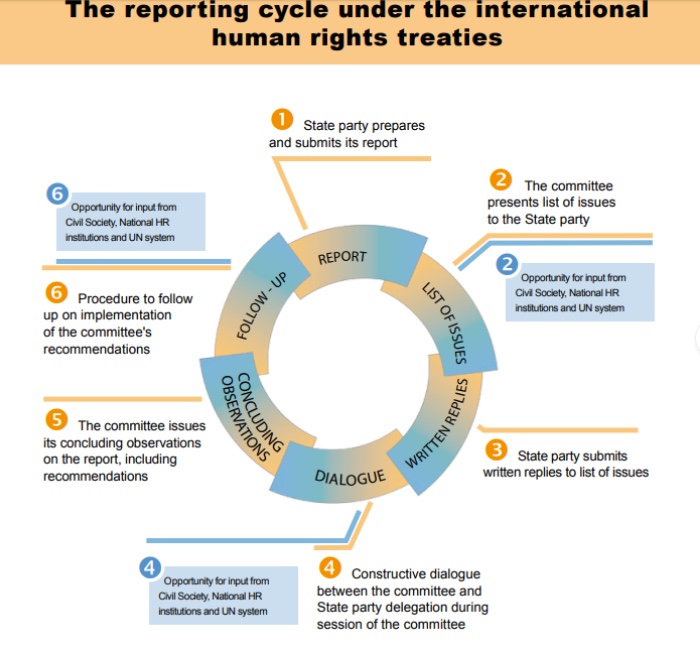By ratifying a treaty, States parties willingly submit their domestic legal system, administrative procedures and other national practices to periodic review by the committees of independent experts. These committees are often referred to as treaty-monitoring bodies (or “treaty bodies”). The main functions of the treaty bodies are to examine reports submitted by State parties and to consider complaints of human rights violations.
The different committees established are composed of independent experts acting in their individual capacity and not as representatives of their Governments, although they are elected by representatives of States parties. Members are elected according to the principle of equitable geographic representation, thus ensuring a balanced perspective and expertise in the major legal systems. The main functions of the treaty bodies are to examine reports submitted by States parties and to consider complaints of human rights violations.
- State reporting: All State parties to the international treaties are required to submit reports stating progress made and problems encountered in the implementation of the rights under the relevant treaty.
- Individual complaints: Three of the international treaties currently allow for individuals to lodge complaints about alleged violations of rights (the Optional Protocol to the International Covenant on Civil and Political Rights, the Convention on the Elimination of all Forms of Racial Discrimination and the Convention against Torture and Other Cruel and Inhuman Treatment or Punishment)
- State-to-State complaints: The same three treaties, in addition to the Convention on the Elimination of All Forms of Discrimination against Women, also make provision for States parties to lodge complaints relating to alleged human rights abuses against another State Party.
By virtue of their responsibilities, treaty bodies serve as the most authoritative source of interpretation of the human rights treaties that they monitor. Interpretation of specific treaty provisions can be found in their “views” on complaints and in the “concluding observations” or “concluding comments” which they adopt on State reports.
In addition, treaty bodies share their understanding on and experience of various aspects of treaty implementation through the formulation and adoption of “general comments” or “general recommendations”. At present, there is a large body of general comments and recommendations serving as another valuable resource with regard to treaty interpretation.
Complaints of human rights violations are technically referred to as “communications”.
Reporting procedures: All treaties require State parties to report on the progress of implementation of the rights set forth in the treaty. The common procedure is as follows:
- Each State party is required to submit periodic reports to the Committee
- The reports are examined by the treaty body in light of information received from a variety of sources including non-governmental organizations, United Nations agencies and experts. Some treaty bodies specifically invite NGOs and United Nations agencies to submit information
- After considering the information, the treaty body issues concluding observations/comments containing recommendations for action by the State party enabling better implementation of the relevant treaty. The treaty body monitors follow-up action by the State party on the concluding comments/observations during examination of the next report submitted. On several occasions, treaty-body recommendations set out in the concluding comments/observations have served as the basis for technical cooperation projects.

(https://www.ohchr.org/Documents/HRBodies/TB/TB_booklet_en.pdf)
